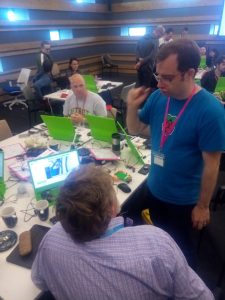Early in June, Digital Maker CIC’s Martin & Phil both attended the amazing Raspberry Pi #Picademy – a two day event, training digital makers / teachers / educators.
The first day gave the attendants insight into several GPIO (General Purpose Input/output) devices & addons for the Raspberry Pi and a great intro into the music making program “SonicPi”. Short presentations were given, with step by step guides for the participants to follow. We started with the classic “blinking LED” attached to the GPIO Pins, using python to program the LED. We moved on to using a “sense hat” and “explore hat”, devices that plug into the GPIO pins of the Raspberry Pi, and contain sensors or motor controllers etc. Again, short “step by step” introductions to the devices, how to use them and how to program them in python were given, with “playtime” of about 20 minutes to see what the participants could come up with.
We were also asked to participate in visualisations of how a breadboard works (how electricity flows through the board, wires, resistors and LEDs). We ended the day with a short “lets make something from the junk box and motor controllers” – with a mad dash to make something fun & eye catching with cardboard tubes, pipe cleaners and “bits n bobs”.
Day 2 was set for a full day of working in teams to use what we had learned in day one, but “bigger & better”, mixing up various inputs & outputs.
Martin had been looking forward to working on an OpenCV project he’d started, and our team worked n making a wheeled robot that could detect “traffic lights” (green = go!, red = stop!). We succeeded much to the surprise of some people’s experience of using OpenCV previously (in such a short space of time).
It was a really exciting, challenging & fun day, and overall experience. A room full of intrepid makers & educators, playing with the Pi & Kit, all making interesting “inventions”, which ultimately stimulated problem solving, creativity and communication (of ideas / progress etc).
Digital Maker CIC were really chuffed with the whole event, not only for just being accepted on this prestigious course, with amazing support & encouragement from the Pi Team, but that our workshops are set up in a similar fashion, giving us the confidence that we’re on the right lines when it comes to working with digital making, creative thinking, problem solving, communication and general “growth mindset” when creating interactive objects through prototyping & GPIO powered by a Pi (or even a MicroBit or Arduino).
If you can get yourself onto a #Picademy, we’d highly recommend that you do, we have learned a great deal from it, and we’ll be applying many lessons to our own practice & workshops in future.

@LegoJames

